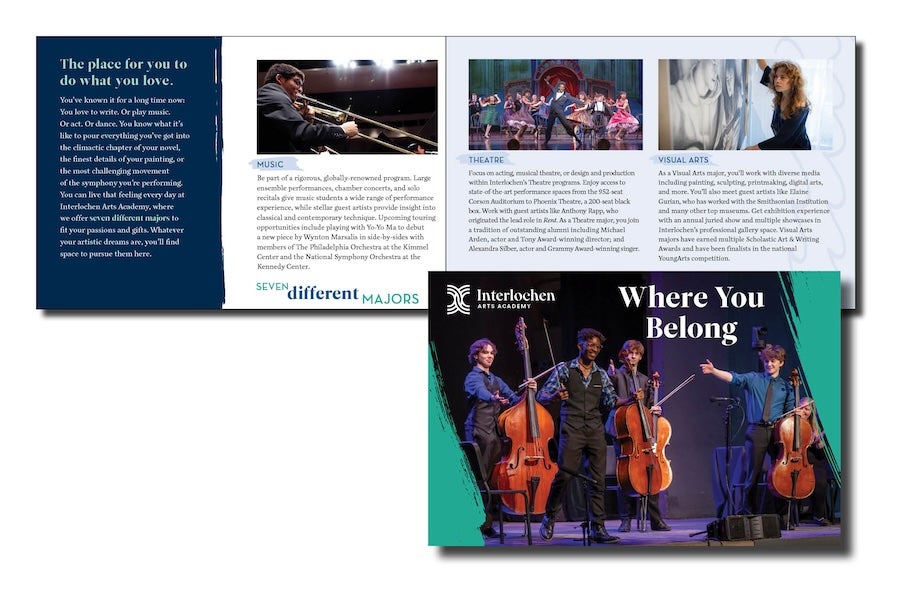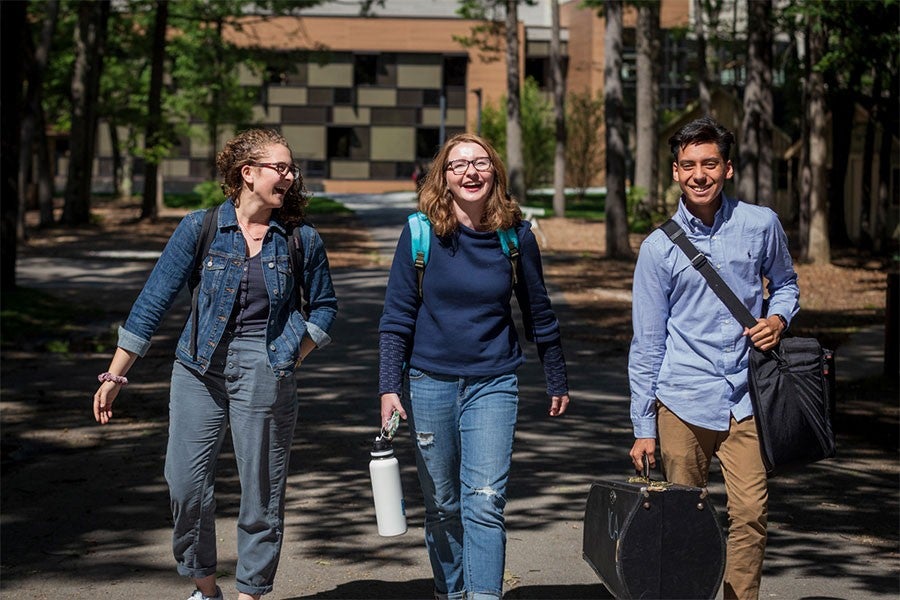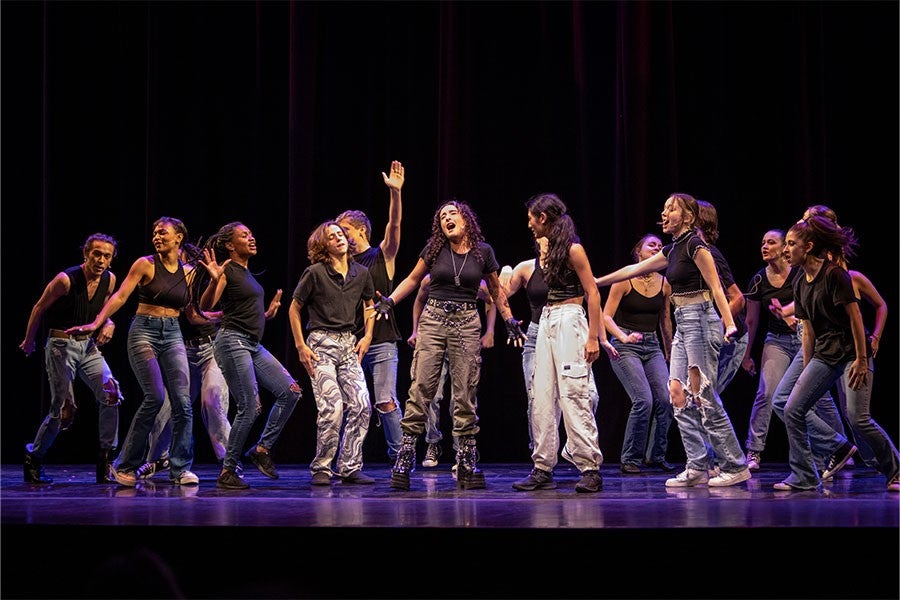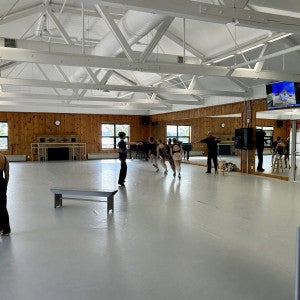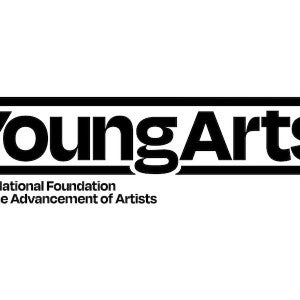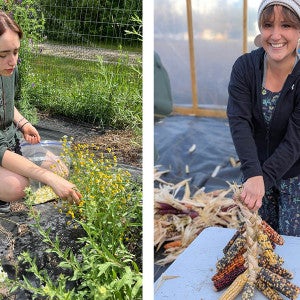How do boarding schools work in the United States?
Interlochen Arts Academy students and education leadership answer your questions about what boarding school is like for students and their families.
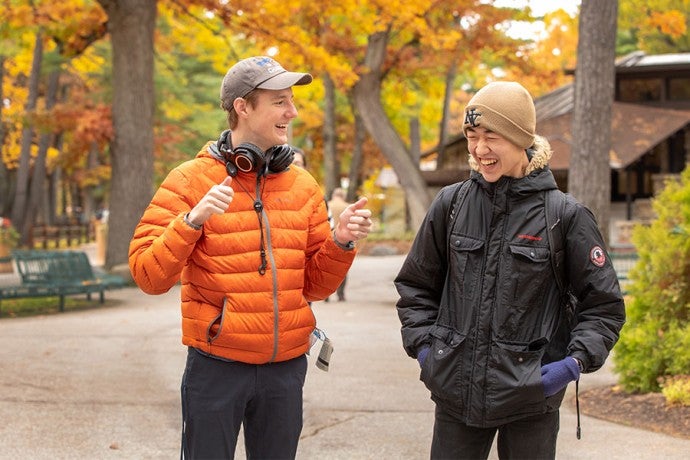
Two Interlochen Arts Academy students share a laugh while walking on Osterlin Mall.
From Netflix’s Wednesday to Brittany Cavallaro’s New York Times best-selling Charlotte Holmes series, boarding schools are a staple of young adult literature, television, and film.
While boarding school may seem like a fanciful concept, approximately 35,000 U.S. students attend a real-life boarding school. So how does boarding school work? And more importantly, what’s it actually like to attend one?
We sat down with students and administrators from Interlochen Arts Academy—one of the premier boarding schools in the U.S.—to give you an exclusive glimpse into how boarding schools work.
What is a boarding school?
A boarding school is an educational institution at which the majority of enrolled students reside. While some schools allow local students to commute to and from campus, most boarding school students eat, sleep, live, and learn on their school’s campus, generally only returning to their homes for school breaks. Although most four-year universities fit the definition, the term “boarding school” primarily refers to residential institutions for students in elementary, middle, or high school.
What is boarding school like?
We have good news and bad news. The bad news: Real-life American boarding schools are nothing like your favorite fictional schools. (You’ll be supervised 24 hours per day, which means midnight hijinks are an absolute no-go.) The good news: They’re still lots of fun—and great ways to prepare for college. Here’s what you can actually expect as a boarding school student.
A day in the life
A typical school day at a boarding school is similar to a day at your current public or private school.
You’ll spend most of your day attending classes, participating in extracurricular activities, or studying on your own. Depending on your school’s schedule and the classes and extracurriculars you’ve chosen, the academic day will begin sometime between 7 and 9 a.m. and conclude between 3 and 6 p.m.
Students at specialized schools may also have a portion of their day set aside to pursue their area of interest. At Interlochen Arts Academy, for example, all students participate in “Arts Block,” a three-hour window reserved for classes and rehearsals in their chosen artistic discipline.
After the class day ends, you’ll likely have free time to use however you like. Most boarding school students spend the evening hanging out with friends, studying, doing their homework, or participating in extracurricular activities.
Extracurricular opportunities
The majority of boarding schools in the United States offer a wide variety of extracurricular activities, including art and music programs, athletic teams, clubs, and more.
For example, Interlochen Arts Academy students can participate in five school-sponsored sports teams or join one of the school’s 30-plus student-run clubs.
The school’s organizations include academic-based clubs such as Model UN, Speech and Debate Club, and the Robotics Engineering Club; affinity groups such as the Queer Student Union, Jewish Student Union, and Black Student Union; athletic clubs including the Tennis Club, Rock Climbing Club, and Cross-Country Skiing Club; and arts-based groups such as the Slam Poetry Club, SFX Makeup Club, and Interlochen Chamber Players.
“Student organizations are a great way to explore your interests, try new things, and make friends outside of your classes,” says Interlochen Center for the Arts Provost Camille Colatosti. “And if you can’t find a club that interests you, you’re welcome to start your own.”
Residence Life
Living on campus is the defining characteristic of the boarding school experience, enabling you to be fully immersed in your school’s community and gain valuable life skills.
At most boarding schools, you will share your room with at least one roommate. Rooming with one of your peers is a great way to learn how to share your space, as you’ll likely have a roommate again in college.
“While living with a stranger can be a challenge, it’s also a wonderful opportunity to gain new perspectives and form a lifelong connection,” says Interlochen Arts Academy Vice Provost of Student Life Megan Walton. “Your roommate is often one of your first friends on campus, which can help ease your transition to life at boarding school.”
Boarding school students are supervised 24 hours per day by a dedicated support team that includes residence hall staff, dorm parents, guidance counselors, school nurses, and mental health counselors. You’ll form especially close bonds with your residence hall staff, who ensure you’ve checked into your dormitory by curfew; help mediate any disagreements between you and your roommate; provide structure and accountability; and plan fun activities to help you connect with other students in your residence hall. Interlochen Arts Academy’s instructors of residence life also play a pivotal role in leading the Academy’s one-of-a-kind social-emotional learning curriculum, The Interlochen 5.
As a boarding student, you’ll eat all of your meals in your school’s cafeteria or dining hall. Most school cafeterias accommodate a wide range of dietary restrictions by offering vegetarian, vegan, and gluten free options. Many schools also have on-campus cafes or student stores where you can purchase snacks, meals, and treats.
Recreational activities
As your home away from home, your boarding school is not just where you eat, sleep, and learn—it’s also where you play.
Boarding schools plan a variety of on and off-campus recreational activities to keep you engaged when you’re not in class or working on homework. Interlochen Arts Academy students enjoy a variety of evening and weekend activities, such as holiday celebrations, intramural sports leagues, movie nights, ski trips, open mic nights, and more.
In addition to regularly scheduled recreational activities, many schools have special events and beloved annual traditions. Interlochen Arts Academy’s traditions include House Clash, a multi-event competition between the Academy’s seven residence halls that takes place during the first weekend of the semester; Street Beat, an end-of-the-year festival featuring carnival games and snacks; and MORP, Interlochen’s version of prom.
Keeping in touch
Boarding schools know that being apart is difficult for many students and their families. As a result, most schools provide creative ways to keep in touch with your loved ones.
“We encourage parents and guardians to stay connected—both with their student and with the school—during their young artist’s time at Interlochen,” Walton says. “Each week, we send an email newsletter to our students and their families to keep everyone informed about what’s happening on campus. We also invite parents and guardians to join us for performances and our fall Family Weekend. Parents who are unable to visit campus in person can schedule virtual appointments with their student’s instructors and can tune into many of our performances via live webcast.”
Boarding schools also offer long breaks, which allow students to return home and spend quality time with their loved ones. Interlochen Arts Academy has three breaks during the academic year: a one-week fall break; a two-and-a-half week holiday break; and a two-week spring break. Like traditional public and private schools, boarding schools are in session from fall to spring, which means you’ll also have a large summer break.
What are the advantages to boarding schools?
With so many excellent public school systems and independent day schools available in communities across the nation, you may be wondering: Why attend a boarding school?
“Whether you want to focus on arts, athletics, or academics, boarding schools offer students a variety of advantages over traditional public or private schools,” Colatosti says. “These advantages include small class sizes, exceptional faculty, the fostering of lifelong friendships, the opportunity to develop independence, and the ability to specialize in a particular subject area.”
A rigorous environment
Many boarding schools were established with the goal of providing exceptional instruction in an immersive environment. In these scholarly communities, students are able to focus deeply on their studies—without the distractions often found at home.
Boarding schools typically have rigorous academic programs that offer access to advanced placement (AP) classes and hard-to-find subjects such as forensic science, Latin, or ecology. These specialized courses can unlock new passions or provide a jumpstart on college studies through transferable credits or early exposure to the subject matter.
At Interlochen Arts Academy, students can choose from a wide range of engaging academic subjects, such as Financial Literacy, Logic & Programming, Middle Eastern Literature, Agricultural Science, Astronomy, and Issues in Latin American History. The Academy offers several Advanced Placement courses, and has partnered with Indiana University's Advance College Project to provide a selection of dual-enrollment courses taught on-campus by Interlochen’s faculty.
Boarding schools recruit the very best instructors to serve on their faculty. Many hold a terminal degree in their field of study, and all have a proven record of pedagogical excellence. Small student-to-faculty ratios ensure that you’ll receive one-on-one support, guidance, and feedback from these experienced educators.
Nurturing independence and practical skills
At a boarding school, you’ll need to manage your own schedule, do your own laundry, make your own food choices, and at some schools, clean your own bathrooms. This independence fosters practical skills and prepares you well for life on your own in college.
“Over the past two years, I have become more independent and learned to trust myself,” says Micah Blair, a senior harp major at Interlochen Arts Academy. “I have also developed a proper structure and work habits to ensure I stay on track and complete all my work while leaving space for free time. Because of this experience, I am confident I will thrive in college and smoothly adapt to the new environment, enabling me to make the most out of my first year.”
Grace O’Connor, a second-year Film & New Media major who lives just a few miles away from Interlochen Arts Academy, debated whether to enroll as a boarding or day student. She ultimately decided that the boarding experience provided a path for both personal development and artistic growth.
“I knew that going to a boarding school would help prepare me for my future by teaching me how to be independent and how to take care of myself,” she says. “The things that pushed me to become a boarding student were the opportunities that I could take advantage of during the evenings and the knowledge that I was going to be able to learn things about myself from being put in a college-like situation as a teenager.”
Ari Han, a junior violin major, agrees. “The boarding experience at Interlochen definitely prepares you for the future—wherever that may be,” he says. “Regardless of where you end up after Interlochen, the skills of communication, collaboration, and time management are definitely helpful.”
Fostering lifelong friendships
At a boarding school, you don’t just see your friends during class—you’ll also spend your evenings and weekends together. This 24/7 access to your peers often results in deeper friendships than those forged at a traditional high school.
“The thing I like best about attending Interlochen is the friendships I've made here,” O’Connor says. “While most people your age are still living at home with their parents, you’re learning and growing alongside your friends during one of the most influential and important stages of your life. These people become your family.”
Specialized instruction
While most boarding schools focus on academics, others offer specialized training in areas such as the arts or athletics.
If you hope to pursue a career outside of the academic world, a specialized boarding school may be right for you. These types of schools are often able to provide access to professional-caliber resources, acclaimed instructors, and one-of-a-kind experiences you might not be able to find at your traditional local high school.
“Interlochen was the only school where I could receive the proper musical training as a harpist,” Blair says. “The harp is a unique instrument, and Interlochen is a remarkable institution because there are four other harpists in my studio this year.”
Han agrees. “Coming from a small city in Virginia, I had little to no opportunities to perform on stage,” he says. “At Interlochen, I get coachings and lessons in chamber music, orchestral playing, and other topics from some of the best teachers you can find at the high school level.”
“We recently played a concert with members of the New York Philharmonic in the newly renovated David Geffen Hall,” Han adds. “I’m one of a very small number of high schoolers who can say they’ve had this type of experience.”
Boarding School FAQ
What are the downsides of boarding school?
The biggest challenge is being away from family for long stretches of time, which can be tough at first but gets easier as students settle in. Boarding school is expensive, though many schools give out financial aid to help families afford it. Students also have to get used to a pretty structured schedule and sharing space with roommates, which takes some adjusting.
At what age should a child start boarding school?
Most boarding schools take students starting around age 13-14, usually in 8th or 9th grade, though some accept kids as young as 10-12. It depends on whether the student feels ready to live away from home and handle the independence that comes with it. Many families choose to wait until high school when students are more mature and prepared for boarding school life.
How much does it cost to go to boarding school in the US?
Boarding school in the US usually costs between $40,000 and $70,000 per year, and some of the top schools can cost over $80,000. The good news is that many schools offer financial aid and scholarships based on a family's income or a student's achievements. Families also need to budget for extras like books, sports equipment, school trips, and travel home during breaks.
Are you allowed to have a phone in boarding school?
Yes, most boarding schools let students have phones, but there are rules about when they can use them. Typically, phones aren't allowed during classes, study time, or after lights out, and some schools collect them at night. Every school is different—some are fairly relaxed about phone usage, while others have stricter rules to help students focus and get enough sleep.
Dive deeper into Interlochen Arts Academy with a free digital viewbook
